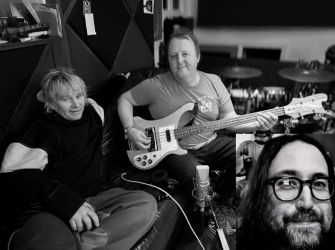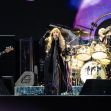In June 2025, a musical milestone quietly unfolded: for the first time, three children of Beatles members collaborated on a song. Sean Ono Lennon, James McCartney, and Zak Starkey, sons of John, Paul, and Ringo, joined forces on “Rip Off,” a dense, psychedelic track released under Mantra of the Cosmos, a supergroup led by Starkey and featuring Shaun Ryder and Bez (Happy Mondays) and Andy Bell (Ride).
Naturally, the release triggered speculation: was this the beginning of a “Beatles 2.0”? A long-theorized supergroup of Beatles descendants, finally materializing?
The answer, according to Zak Starkey, is unequivocally no.
Speaking to The Telegraph, Starkey dismissed the idea that the track was meant to evoke or complete the Beatles legacy. When asked whether Dhani Harrison, son of George, was missing from the picture, his response was curt: “No, I don’t. Why do I?” He continued, “It’s not [like the Beatles]. It’s Mantra of the Cosmos with them in it. It’s Sean of the Cosmos and James of the Cosmos. It’s still my band.”
That assertion draws a clear line between collaboration and legacy. While the inclusion of Lennon and McCartney’s “kids” carries obvious symbolic weight, Starkey frames it as creative coincidence, not mythmaking. There is no attempt here to revive the Beatles brand or replicate its energy. Instead, “Rip Off” feels more like a psychedelic experiment filtered through the warped lens of post-Britpop Britain.
The idea for Mantra of the Cosmos originated with Hartwig Masuch, former BMG CEO, who suggested a Britpop supergroup. Starkey didn’t take the bait. “A Britpop supergroup?” he recalled, in conversation with Rolling Stone. “You think I’m going to call Johnny Marr, Liam Gallagher, and Paul Weller, and they’ll go, ‘Wow, what a great idea!’? Even I don’t want to do that. If I’m not in, they won’t be.”
Instead, Starkey built something stranger. Mantra of the Cosmos is chaotic by design by a swirling blend of psychedelia, rave culture, and underground rock. In that context, the presence of Sean and James doesn’t read as strategic. It feels incidental. There’s no marketing push behind a next-generation Beatles group, no attempt to repackage nostalgia for commercial gain.
But for longtime fans, the collaboration is undeniably meaningful. For decades, the idea of a Beatles “second generation” band has hovered over interviews and headlines. In 2012, James McCartney floated the possibility of forming a group with other Beatles children. In an interview with the BBC, he said, “I don’t think it’s something that Zak wants to do. Maybe Jason [Starkey’s brother] would want to do it. I’d be up for it. Sean seemed to be into it, Dhani seemed to be into it. I’d be happy to do it.” When asked if it might ever happen, he added, “Hopefully, naturally… maybe. The will of God, nature’s support, I guess.”






